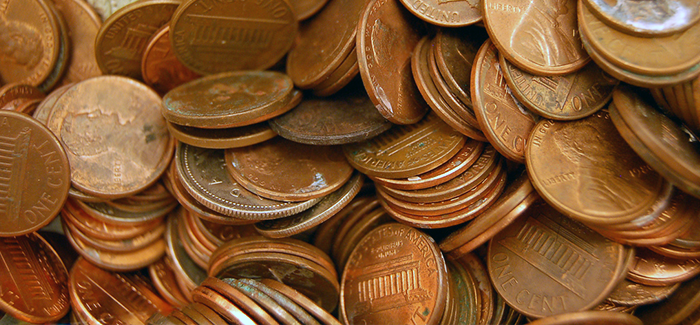
Pennies. (Photography by foreverseptember, CC BY-ND 2.0)
Reminded of their professional identity, bankers became more dishonest.
In the financial industry, new research suggests it may not be the apples that are bad; it may be the barrel. In a study by Chicago Booth postdoc Alain Cohn and two University of Zurich coauthors, roughly 200 bank employees—128 from an unnamed international bank and 80 from other banks—were asked a series of questions intended to remind them either of their profession or their personal lives. Afterward they tossed a coin 10 times and reported the results. The researchers gave the subjects an incentive to cheat: for each toss, either heads or tails would win a $20 reward, and no one was watching.
In the charts at right the binomial results show the reported outcomes researchers would expect from honest participants. The control group, who answered questions about their personal lives, reported successful coin flips 51.6 percent of the time, only slightly above chance. But subjects primed with questions about their professional identity reported a much higher success rate of 58.2 percent. The isolated light blue bar on the far right represents those who claimed to have flipped heads or tails successfully all 10 times, winning $200.
The researchers attribute the discrepancy to a banking culture that weakens social norms and rewards fraud. A change in that culture is essential, they write; long-term economic stability depends on people’s trust in bankers’ honesty.
Distribution of earnings in the coin tossing task claimed by the bank employees. a, b, Each successful coin toss yielded approximately $20. a, Distribution of earnings in the control condition in comparison to the binomial distribution implied by honest reporting. On average, bank employees reported 51.6% successful coin flips, which is not significantly different from 50% (P = 0.415, two-sided t-test; n = 67). b, Distribution of earnings in the professional identity condition in comparison to the binomial distribution. Bank employees in the professional identity condition reported 58.2% successful coin flips, which is significantly above chance (P = 0.002, two-sided t-test; n = 61) and significantly higher than the reported success rate in the control group (P = 0.033, two-sided rank-sum test; n = 128).
Updated 02.13.2015 to correct chart labels and add original caption.Infographic
[[{"type":"media","view_mode":"media_original","fid":"2362","attributes":{"alt":"","class":"media-image","height":"138","typeof":"foaf:Image","width":"220"}}]]
Long-term economic stability depends on people’s trust in bankers’ honesty.
